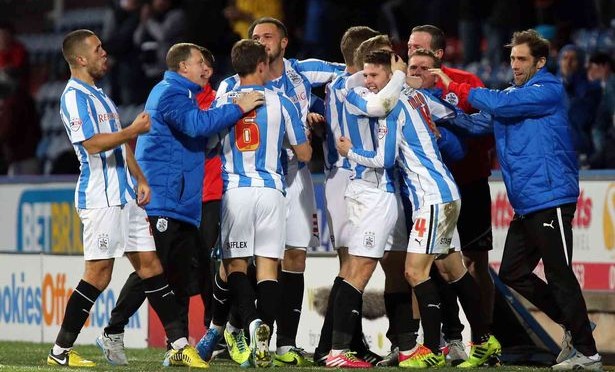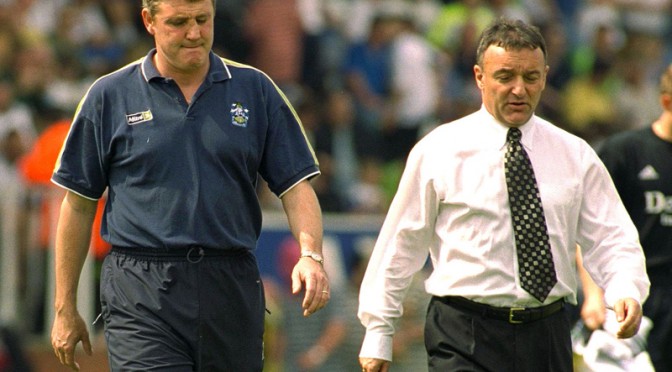As Town brought the curtain down on 2013 with a thumping 5-1 victory over Yeovil, there was a real sense of optimism around the club and a definite feeling that the club was moving in the right direction. A series of impressive performances in November and December – including wins against Burnley and Bolton, as well as creditable draws with Brighton and Derby – saw Town sat in 11th place and just 4 points off the play-offs at the halfway stage of the season.
Although any talk of Town mounting a push for the play-offs this season was always likely to be wishful thinking, the way in which Town’s form has dipped as the season has gone on has been hugely disappointing. The forward momentum that Town seemed to be building towards the end of 2013 has all but evaporated and it is almost as if the team has regressed to the stage it was at when the season began. To put into context just how much Town’s form has dropped, it is worth pointing out that in the first 23 games of the season Town gained 31 points – the equivalent of 1.34 points per game. Since then, however, Town have picked up 14 points from 15 matches, or just 0.93 points per game. There are no two ways about it – Town’s form since the turn of the year has been borderline relegation form.
| Games Played | Points Gained | Goals Scored | Goals Against | Goal Difference | Points Per Game |
| 23 | 31 | 31 | 26 | +5 | 1.34 |
| 15 | 14 | 18 | 27 | -9 | 0.93 |
Admittedly there have still been some good moments in the second-half of Town’s campaign. Town were excellent, for example, in victories against Birmingham and Barnsley; however, this has only served to prove the point that Town are capable of much better than that what they have been producing of late. At the minute it really does feel like the team is taking one step forward and two steps back, and if there is one word that aptly sums up Town’s performances since January it would be “inconsistent.” This is exemplified by the fact that between the Leeds match on the 1st of February and the Doncaster game on the 8th of March, Town’s record was lose, win, lose, win, lose, win, lose. Town’s failure to string together a positive sequence of results has prevented the team from building any momentum or a foundation to build from, and has led to a series of disjointed and patchy performances.
One of the major factors behind this inconsistency seems to be complacency. With a mid-table finish virtually guaranteed, the players seem to have accepted that their work for the season is done and that they can take it easy for the remainder of the season. This may not actually be the case but it is certainly the feeling among supporters. Sloppy individual errors have been increasingly apparent in Town’s play and it is galling that Town are not making their opposition work hard to get a result. Against Blackburn and Leeds, for example, poor decisions and performances by individual players saw Town throw away the opportunity to gain positive results against mediocre opposition. Furthermore, some of Town’s better performers from the beginning of the season, i.e. Jonathan Hogg, Adam Hammill and Oliver Norwood, have all failed to reproduce their early season form on a consistent basis – something that was clearly evinced by Mark Robins’s decision to drop Hammill and Norwood for the recent match against Charlton.
Even more disappointing has been the fact that Town have allowed themselves to be outfought by teams who simply wanted it more. It is fair to say that the current Town squad has a dearth of on-the-field leaders and although there are a number of players who are brilliant when things are going well, there are too many players who seemingly go missing when the chips are down and the team is struggling. Against Leeds, Doncaster and Sheffield Wednesday, for example, Town were not prepared to scrap and subsequently capitulated against distinctly average – but more motivated – opposition.
Although it may seem irrelevant whether Town finish 7th or 21st, the reality is that Town need to finish as high up the league table as possible in order to keep the momentum of the last couple of seasons going. Town will look a much more attractive proposition to potential new signings, and indeed to the more talented players currently at the club, if there is clear evidence that Town are a club that is on the up and constantly progressing. Although those who watch Town on a regular basis are quite rightly able to say that Town have come on leaps and bounds over the last 12 months, this is not something that is necessarily apparent to the majority of people outside Huddersfield. If Town were to finish in a similar position to last season, for example, there is a chance players will continue to see Town as capable of achieving little more than survival or lower mid-table at this level. On the other hand, the higher Town finish, the more players will be attracted to Town as a club that is on the up and developing all the time. As such, it is not good enough for Town to simply accept that the aim of achieving mid-table has been accomplished and that they can subsequently start their summer break early.
Nevertheless, it is worth remembering that Town are still very much a work in progress. Though it does not really excuse some of the performances Town have put in in recent weeks, it is easy to forget how far Town have come in the last 12 months – after all, Rome was not built in a day. What is more, the second-half of this season has been characterised by injuries to several key players, most notably the highly influential duo of James Vaughan and Joel Lynch, and this has seriously underlined Town’s lack of strength in depth.
Without wishing to single out individual players for criticism, it is evident that a high percentage of the current squad are no longer good enough for what the club is trying to achieve. Though Town have a relatively strong starting 11 when everyone is fit and available, a combination of poor recruitment in the summer – only James Vaughan, Adam Hammill and Jonathan Hogg can be deemed good signings – coupled with the fact Town are still burdened with players on big wages from the Simon Grayson and Lee Clark regimes, has meant that Town have not been able to build a squad full of players capable of competing in the Championship.
Don’t get me wrong. It is not as if 2014 has been a disaster for Town, it has merely been frustrating that Town have failed to play to their true potential on a more regular basis. If Town are able to learn from the mistakes they have already made, and ensure they do not repeat them in the future, then I remain convinced that Town will be able to push on again in 2014-15. Despite a questionable record in the transfer market so far, I remain utterly convinced that Mark Robins remains 100% the right man for the job and have faith that he will be able to operate more astutely in the upcoming summer transfer market. If the club is able to shift some of the considerable deadwood that is still at the club, and replace them with at least 4 or 5 quality players, then Town should be well in contention for a top-half finish next season. Furthermore, if some of Town’s talented young players can keep themselves fit and add consistency to their game, then there is no reason to suggest that Town can’t aim even higher than that. After all, the Championship is nothing if not incredibly open.
Follow me on Twitter (@JThorn26)







